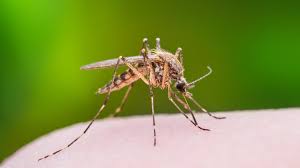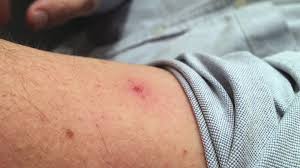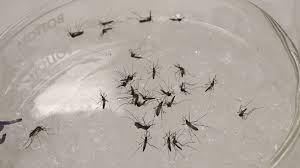How Not to Kill Mosquitoes
First, you need to understand the difference between repelling mosquitoes and killing them. Repellents make a location (like your yard or skin) less attractive to mosquitoes, but don’t kill them. So, citronella, DEET, smoke, lemon eucalyptus, lavender, and tea tree oil might keep the insects at bay, but won’t control them or get rid of them in the long run. Repellents vary in effectiveness, too. For example, while citronella may deter mosquitoes from entering a small, enclosed area, it doesn’t really work in a wide open space (like your back yard).
There are a host of methods that actually do kill mosquitoes, but aren’t great solutions. A classic example is a bug zapper, which kills only a few mosquitoes, yet attracts and kills beneficial insects that keep the mozzy population down. Similarly, spraying pesticides is not an ideal solution because mosquitoes can become resistant to them, other animals get poisoned, and the toxins can cause lasting environmental damage.

How to Get Rid of Mosquitoes Inside the House
- If you live in an area with many mosquitoes, you should use mosquito netting to protect infants less than two months old.
- Wear clothing from head to toe if possible, as limiting skin exposure will lower the chances of mosquito bites.
- Avoid wearing black or other dark colors, especially in warm weather, as they keep your body warm. Mosquitoes are attracted to warm bodies, and that’s not a recipe for bite-free success.
- Avoid wearing perfumes, as mosquitoes are attracted to the scent mixed with our body sweat.
- Use weather-stripping products to seal any door gaps. Protecting your home entry is an important step to reduce the access mosquitoes have inside.
- Eat more garlic. If you consume a lot of it, your sweat will smell like garlic. The smell deters mosquitoes and keeps them away naturally.
- Try using silicone caulk or screen patches to prevent mosquitoes from entering the house. Make sure that no screens have holes or tears. Turn on fans because they can break up carbon dioxide and throw mosquitoes off course.

How I Tested The Dish Soap Mosquito Killing Home Remedy
Using my kitchen area as a test center, (to my wife’s dismay but it was her idea), I placed a small saucer on our stove each night. The saucer was filled with water and two to three small squirts of dish soap. I did not stir or aggregate the soap in the water. I simply squirted it in and left it.
I made sure the overhead light on our vent-a-hood was left on over the stove. Although evidence of light attracting mosquitoes has been mostly debunked, it does help them to navigate. I wanted to make sure they could see the saucer of water. All the other lights in the house were turned off.
I also made sure that the sinks in the kitchen were empty and dry. I did not want to offer alternative water areas. By the same token, toilet lids were closed and bathroom doors were shut.
And so, I have a controlled test center. Let the battles begin!

Mosquito Predators
Mosquito Predators – what eats mosquitoes?
Mosquitoes have a number of predators that collectively can exert some influence on reducing mosquito populations. However, with a very few exceptions, predators generally have little effect on reducing the mosquito population over a large area. So, what are some animals that are mosquito predators?
Bats
While bats eat mosquitoes, they are far more effective at locating, catching and eating insects other than mosquitoes.
Birds
Many birds will eat mosquitoes. The more important among these are purple martins, swallows, waterfowl (geese, terns, ducks) and migratory songbirds. Bird predators usually eat both the adult and aquatic stages of mosquitoes.
Fish
Goldfish, guppies, bass, bluegill and catfish prey on mosquito larvae. But the most important fish predator, by far, is the Gambusia affinis, commonly known as the mosquito fish. This is probably the most effective predator of mosquito larvae and is used by many mosquito control agencies to augment their control efforts.
Frogs and Tadpoles
Most adult frogs and tadpoles do not include mosquitoes as a large part of their diet. Tadpoles infrequently feed on mosquito larvae and instead generally feed on small, suspended particles of plant-related materials. However, mosquito larvae predation is known for three species of North American tadpoles – the spade foot toad, green tree frog and giant tree frog. While not a direct act of predation, tadpoles may compete with mosquito larvae for food.
Turtles
The red-eared slider turtle is generally thought to be the most voracious turtle that feeds on mosquito larvae.
Plants And Animals That Cut Down On Mosquitoes
Of all the pests and bugs that can invade your yard, mosquitoes can be some of the most annoying, especially during the warm summer months. When spending time by the pool or lounging outside for a barbecue, nothing can ruin it more quickly than the constant buzzing, bites, and irritation that mosquitoes bring.
Finding a way to lower the numbers of these pests can be pretty difficult. While several chemicals and sprays have been developed to kill mosquitoes and halt their reproduction, natural solutions also exist. For the best protection, smart homeowners can use natural predators and plant-based deterrents to reduce the mosquito population in their yards without resorting to chemicals.
Here are some of the plants and animals that can help cut down your mosquito problem:
- Marigolds
Beyond their beautiful and vibrant coloration, the scent that marigolds release make them a great natural mosquito deterrent. They’re also known to keep away other insects that can damage your other plants, making them especially helpful for gardeners or people who like to grow some of their own food.
Plant some marigolds in your yard, either from a starter plant or from a seed, and start solving your mosquito problem and beautifying your home simultaneously.
- Citronella
While largely produced in Asia, the citronella plant is a well-known mosquito solution among southern homeowners. This clumping grass emits a strong scent that’s quite effective for mosquito and other insect control, and its natural properties have made it a common ingredient found in several insect repellants.
The herb has also been used in many other ways, such as a perfume or as a way to calm barking dogs. It has even had success as a spray to keep pests from destroying furniture and other household valuables, meaning that homeowners that invest in citronella plants for mosquito protection may be able to glean several additional benefits.
Citronella can be planted in a large pot, or used as an ingredient in candles or torches.
- Catnip
While, as the name implies, catnip is more widely-known for its effect on cats, it nevertheless serves as a potent mosquito repellant. A close relative to the mint plant, catnip, like citronella and marigolds, releases a scent that mosquitoes can’t stand, deterring them from approaching.
Unfortunately, catnip only works well as a repellant if the mosquitoes are in close proximity to the plant, meaning that you probably won’t be able to protect your entire yard with just this plant. However, the oil in catnip can work wonders when applied to the skin, acting as a natural bug spray. Catnip is also very easy to grow and maintain, making it easy to keep a steady supply.
Just remember how intense the effect of catnip is on cats, and how powerfully they are attracted to it. You don’t want to replace one pest with another in the form of unwanted felines on your property.
- Dragonflies
Why not use a helpful insect to fight a harmful one? In the realm of animals that help maintain mosquitoes, dragonflies are among the most unique. Dragonflies consume a lot of mosquitoes, but sometimes even with the large amount they ingest, they may not seem to to have a significant impact on the problem.
However, their real strength is less in stopping an existing mosquito infestation and more in preventing them in the future. Dragonflies do consume adult mosquitoes, but they have a much greater impact on mosquito larvae. Mosquitoes lay eggs in bodies of standing water, which dragonflies will happily eat up before they have a chance to grow into adults.